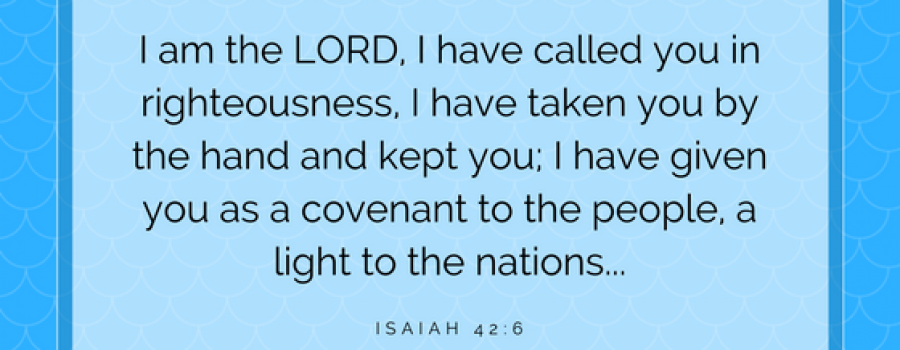Why does Jesus come to John for baptism? A sermon on Matthew 3:13-17.
Isaiah 42:1-9
Here is my servant, whom I uphold, my chosen, in whom my soul delights; I have put my spirit upon him; he will bring forth justice to the nations. He will not cry or lift up his voice, or make it heard in the street; a bruised reed he will not break, and a dimly burning wick he will not quench; he will faithfully bring forth justice. He will not grow faint or be crushed until he has established justice in the earth; and the coastlands wait for his teaching.
Thus says God, the LORD, who created the heavens and stretched them out, who spread out the earth and what comes from it, who gives breath to the people upon it and spirit to those who walk in it:
I am the LORD, I have called you in righteousness, I have taken you by the hand and kept you; I have given you as a covenant to the people, a light to the nations,to open the eyes that are blind, to bring out the prisoners from the dungeon, from the prison those who sit in darkness.
I am the LORD, that is my name; my glory I give to no other, nor my praise to idols.
See, the former things have come to pass, and new things I now declare; before they spring forth, I tell you of them.
Matthew 3:13-17
Then Jesus came from Galilee to John at the Jordan, to be baptized by him.
John would have prevented him, saying, “I need to be baptized by you, and do you come to me?”
But Jesus answered him, “Let it be so now; for it is proper for us in this way to fulfill all righteousness.” Then he consented.
And when Jesus had been baptized, just as he came up from the water, suddenly the heavens were opened to him and he saw the Spirit of God descending like a dove and alighting on him.
And a voice from heaven said, “This is my Son, the Beloved, with whom I am well pleased.”
***
About a month ago now, one of you stopped me in the narthex and asked, “You’re a bit of a Christmas sap, aren’t you?”
Guilty as charged. I love Christmas. You could probably tell.
But all the same, there is something refreshing about the change of the liturgical season, the shift from Christmas back to ordinary time.
Yesterday we gathered to put the Christmas trees back in their boxes and package the nativity in bubble wrap and vacuum up dropped leaves from the poinsettias. Holy housecleaning.
And as beautiful as the sanctuary was decorated for Christmas, there is something refreshing about seeing it clean and bare today.
Well, almost.
You may have noticed the addition to the baptismal font.
Today is baptism of the Lord Sunday, and I wanted you to see the water. It’s hard to see water though—clean water, at least—so I hope the blue fabric will remind you of the river of God.
Our scripture for today shifts to a barer landscape too. Last week Matthew told us about magi, and kings, and scribes, and stars, and we went inside Mary and Joseph’s little house to see the gifts of gold and frankincense and myrrh piled there. Last week was political intrigue and wealth and power.
This week is very different. Jesus has grown up. (It is always a bit of a shock how fast kids grow up, but none more so than Jesus, who accomplishes the feat in a single liturgical week.) Matthew takes us to a desert, beyond the towns, just grey rock and yellow sand, and a thin line of green plants drawing life from a shallow river. You can feel the desert wind.
And beside the river, not a richly clad king, but a prophet in a camel’s hair robe and leather belt. A prophet all alone; his father was a temple priest, a man of good standing, a man in good order, but John does things differently. John doesn’t ask people to sacrifice pigeons or goats or oxen for their sins. John asks them to sacrifice of themselves—sacrifice their pride, their dignity, their self-assurance. He asks them to repent—to say out loud what it is that they’ve been up to, so that others might hold them accountable for it later, so that they can be honest about what needs changing in their lives. And then he asks these people—sensible, grown-up people—to walk into a river and let him dunk them. And they do. They come and they come and they come and they come, because at the end of the day it’s a relief to be able to tell the truth about yourself, and learn you are forgiven anyway.
And then they get to go back to their lives dripping wet, marked forever as one who has been willing to undergo the grace of God.
And then God walks on the scene, and gets in line.
No one knows, not even John. John has been telling people about the “one to come”—one who will baptize them with fire, one who will be more powerful even than John. But John does not expect this “one to come” to actually be God—because who would dare to expect such a thing? Who would dare to think that God would, after all those millennia, come to you?
But John does expect Jesus to be a great prophet, one to bring the full power of God down on the people. And so when Jesus gets to the front of the line, John by his prophetic knowledge knows that this one is different.
“One baptism, please,” Jesus asks, and John panics. “I need to be baptized by you, and do you come to me?”
“Do you come to me?”
It is not often that I find myself identifying on a spiritual level with John the Baptizer. I have never found locusts appetizing. But man oh man have I asked this exact question of God, time and time again. “Do you come to me?”
“Do you come to me, to bless you?”
“Do you come to me, to do your work?”
“Do you come to me, to serve your people?”
“Do you come to me, to be your hands and feet?”
“Do you come to me?”
“Me?”
“Really?”
Last month we talked a lot about God coming down as the baby Jesus, to love us, and there was something so comforting about that baby face, that baby love, sweet and simple.
But now that baby is all grown up, and standing in front of us, asking us to bring a blessing to him. Now that baby is all grown up, and coming to us, to work alongside him.
John knows with every fiber of his being that this is the wrong way round. Jesus is more powerful than he will ever be—shouldn’t he be the one doing the blessing? He could, of course. They both know he could. But for some reason, he’s asking John to do the blessing—he’s willing to let himself be dunked in the muddy Jordan, thick with the washed-off sins of everyone who passed that way already, just to be one of them, one of the beloved, repentant, honest, marked community of God.
“Let it be so then; it is proper for us to fulfill all righteousness,” Jesus says, and it sounds so dry and stiff and pro forma, let’s just check this box and be done with it. But read under the words: John blessing Jesus will be an act of righteousness. And in this moment Jesus redefines what righteousness is, and you wonder if any of the Pharisees and Sadducees were still hanging around to hear it, if their beef started right then, because in Jesus’ eyes righteousness is not about crossing the t’s and dotting the i’s in a way that doesn’t anger God, but about living in such a compassionate and joyous and loving way that what you do is a blessing to God. Righteousness isn’t about following the rules in order to fly under God’s radar. Righteousness is about grabbing God by the hand and saying I love you with every single action.
And so it is that John, prophet but mortal, man of the odd fashion sense and the even odder diet, comes to dunk Jesus under the waters of the Jordan, and to tell this sinless man that his sins are forgiven, because to hear words of forgiveness is a delight to God.
And God in heaven shows that delight by opening up the heavens, and God the Spirit soars down to rest on the dripping wet shoulder of God the Son, the beloved. The Holy Trinity, blessed and full of blessing.
God comes to us for blessing. Not because God needs it from us, but because God delights to see us be more loving, more joyful, more courageous, more faithful. God sees us as blessings. Blessings in human skin, just waiting to reach out and bless others. That is how God created us to be. Beloved blessings for God’s beloved world.
There is a line in the Presbyterian Book of Order that I love—you might be surprised, but the Book of Order is actually pretty good literature if you give it a chance. Buried in section three of article two of the Directory for Worship is one of the clearest summations of Christian living I know:
“Baptism is God’s gift of grace and also God’s summons to respond to that grace. Baptism calls to repentance, to faithfulness, and to discipleship. Baptism gives the church its identity and commissions the church for ministry to the world.” (W-2.3006)
Baptism is God’s gift of grace to us, grace enough to turn our sin-spotted lives and messy efforts into blessing enough for the world we know. Baptism is God’s call to respond to that grace, to go out into the world to love and serve and be truthful and kind. In baptism, God comes to us and says: you are going to be my blessing. You are going to be my blessing in this world.
Nora and Carolyn are our most recent baptees in this congregation. They probably are off the hook for now, but in a few more years—maybe five, maybe fifteen, maybe fifty—God is going to come to them and say, it’s time. It’s time to be my blessing. It’s time to be brave and faithful. I’m coming to you to do this work. I prepared you for it ages ago. I’m putting it in your hands.
In baptism we are forgiven, but not just so we can feel good about ourselves, not just so we can wave our clean records under other people’s noses. In baptism we are forgiven so we can get over ourselves and our failings and get on with God’s holy work. In baptism we are forgiven so that when God comes to us, there will be nothing holding us back.
About a million times a day I echo John’s disbelief. You come to me? But God does. Over and over, despite all the evidence I can give that I am not worthy to be God’s co-worker, God comes to me and says, “look here. I have work for you to do. You are forgiven, freed, and blessed. So no excuses. Get to it.”
Over and over, Jesus comes to us. I’m asking you to bless me, he says.
Will we?
Amen.



Leave a Reply
Your email is safe with us.